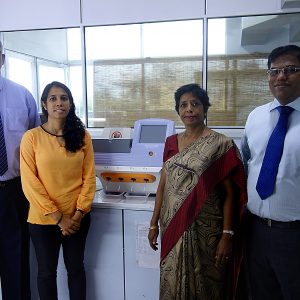Situation
Coconut is one of the major and economical important plantation crops in Sri Lanka, providing livelihood for nearly 0.5 million people (Ministry of plantation industries, 2008). The country has earned about 120 $ million in export revenue by exporting coconut products. A major outbreak of WCLWD was first reported in 2006 in Weligama area and has so far affected trees in Galle, Matara, and Hambanthota districts in the Southern Province. WCLWD causes permanent injuries to the plant reducing its productivity although it is not lethal1.
Disease management has become a challenge due to slow development of and difficulty in identifying the symptoms. No reliable therapeutic agent is yet available for phytoplasma. The only preventive method is to remove and dispose all affected trees. Up to now, nearly 100,000 coconut trees in the Matara district have been cut down and destroyed. Dire consequences may arise if this disease spreads to the coconut triangle in the Western and North Western provinces, which includes an area of more than 70% of the total coconut cultivated land in the country1.
The inability to culture in pure cultures in vitro, their low concentration and uneven distribution in the host plant obstructs the identification process to a great extent2. Routine detection demands a highly specific, sensitive, and rapid diagnostic test3. Although phytpoplasma specific indirect ELISA assays are currently used as serology based technologies for routine identification of the disease, it involves a large cascade of steps including phytoplasma purification, raising diagnostic monoclonal antibodies and other pre-purification steps. These antibodies are normally raised on experimental animals.

Solution
An extensive, molecular based investigation was carried out to overcome the problems in routine testing methods and to establish a “Disease Index” based on the severity of the phenotypic symptoms of the disease. Samples were collected from the palms that were WCLWD-affected, and purified DNA extracts and plant tissue were sent to Macrogen (Korea) and to the University of Nottingham (UK) for direct sequencing of 16s rRNA gene. 16s rRNA analysis successfully identified the disease aetiology, its origin as well as the intragenic variations of the specific phytoplasma from other suspected phytoplasma species4.
Benefits
Although, in this case,16s rRNA gene sequencing was performed at the University of Nottingham (UK) and Macrogen (Korea) due to the lack of technology in Sri Lanka seven years ago, now Credence Genomics has made a benchmark approach to make the very same technology available in the country for the first time using the newest technology platform-Next Generation Sequencing. This will be an opportunity for researchers to broaden horizons of genetic testing right here in Sri Lanka.
| Serological assays- Phytoplasma specific Indirect ELISA | 16s rRNA gene sequencing |
| Involves a cascade of antibody preparation steps including raising diagnostic monoclonal antibodies to WCLW phytoplasmas. | DNA extracted from the sample is directly tested in one run. |
| Non – specific binding with the antigen may occur. Small concentrations of the analytes in the sample have to compete with other serum proteins when binding to the antigen. Thus will result in lower levels of accuracy ̴80% | High specificity with an unmatched accuracy of 99.9% |
| Identification process a minimum turnaround time of 1 day. | Testing can be done just in 12 hours. Relatively faster |
| Does not facilitate identification of intragenic variations and comparative studies among closely related species. | Facilitates identification of intragenic variations and comparative studies among closely related species. |
| Parallelizing is limited only to 96 samples per plate. | A maximum of 200 samples can be tested in one run |
Reference-
- Kanatiwela, Chamini, et al. “Weligama Coconut Leaf Wilt Disease (WCLWD) causing phytoplasma.” Annual Research Symposium. 2012.
- Franova, Jana, et al. “Experiences with phytoplasma detection and identification by different methods.” Bulletin of Insectology2 (2007): 247.
- Heinrich, Maria, et al. “Improved detection methods for fruit tree phytoplasmas.”Plant Molecular Biology Reporter2 (2001): 169-179.
- Perera, L., et al. “A PHYTOPLASMA IS ASSOCIATED WITH THE WELIGAMA COCONUT LEAF WILT DISEASE IN SRI LANKA.” Journal of Plant Pathology1 (2012): 205-209.


